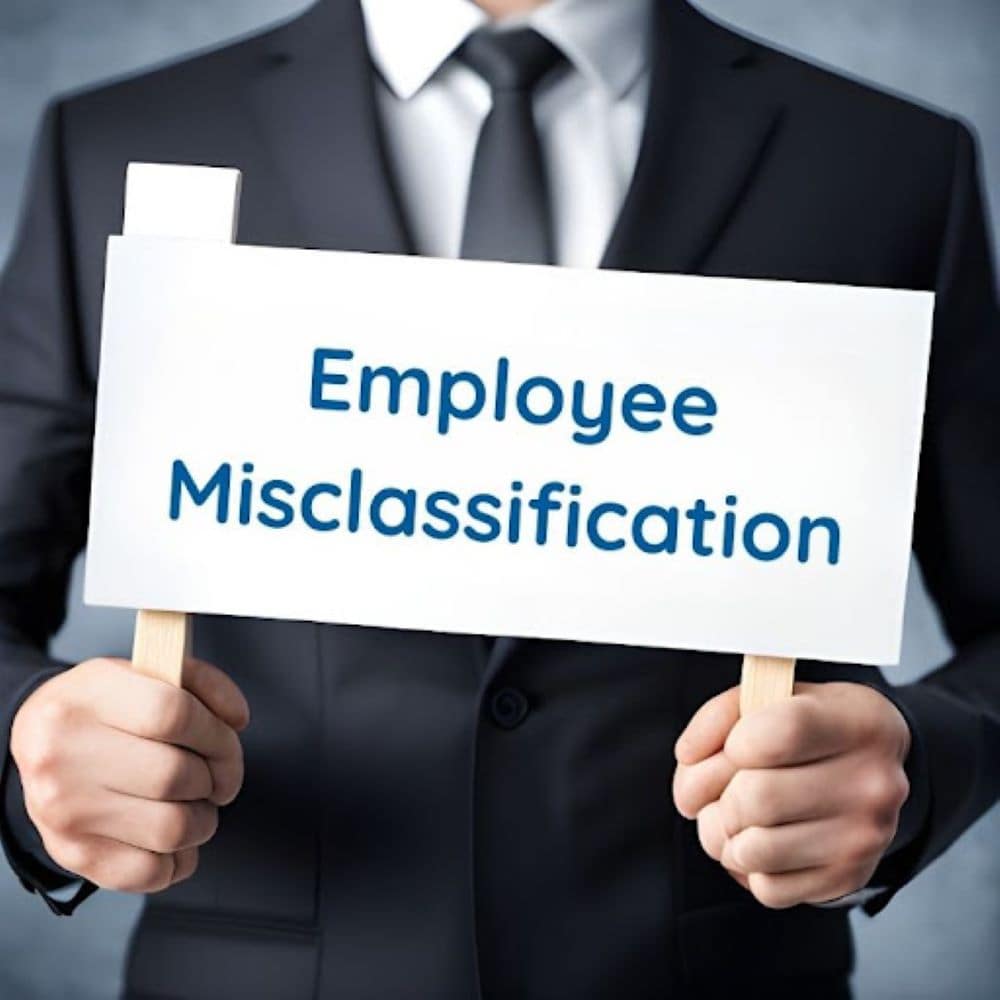
Misclassification of employees is a common issue in the workplace, with significant implications for both workers and employers. In Nevada, as in many other states, misclassification can result in serious legal consequences for employers. If you believe you have been misclassified by your employer, you may wonder how much you can sue them for in Nevada.
Let’s explore the key considerations surrounding misclassification lawsuits in Nevada and what you need to know.
Understanding Employee Misclassification
Misclassification occurs when an employer incorrectly categorizes a worker as an independent contractor rather than an employee. This misclassification can lead to the denial of various employee benefits and protections that employees are entitled to under the law, such as health insurance, workers’ compensation, minimum wage, overtime pay, workers’ compensation, and unemployment insurance.
Misclassification can also have tax implications for workers, as independent contractors are responsible for paying their own payroll taxes.
Causes of Employee misclassification
Employee misclassification, where workers are improperly classified as independent contractors or vice versa, can occur due to various factors. Here are some common causes:
Lack of Understanding: Employers may misclassify employees due to misunderstanding or ignorance of labor laws and regulations regarding classification. They often overlook the critical determination of employee status, which is essential to avoid misclassification and ensure workers are granted their rightful benefits and protections.
Cost Savings: In some cases, employers may intentionally misclassify employees as independent contractors to save on costs associated with payroll taxes, workers’ compensation insurance, and benefits.
Flexibility: Some employers may prefer to classify workers as independent contractors for the flexibility it provides in terms of work schedules and termination procedures.
The complexity of Regulations: The complex and varying nature of labor laws and regulations across jurisdictions can lead to unintentional misclassification by employers who struggle to navigate the legal landscape accurately.
Confusion over Job Roles: Certain job roles blur the line between employee and independent contractor status, leading to confusion during classification.
Contractual Arrangements: Poorly drafted contracts or agreements may fail to accurately reflect the true nature of the working relationship, leading to misclassification.
Consequences of Misclassification
The consequences of misclassification can be significant for workers. In addition to being denied important benefits and protections, misclassified employees may be responsible for paying their business expenses, such as equipment, supplies, and transportation costs.
This can result in a significant financial burden for workers, particularly those who are already struggling to make ends meet. To address these injustices, misclassified employees have the right to recover unpaid wages, including overtime pay, and seek additional damages for the financial losses they have endured due to misclassification.
Who Is At Fault
Determining fault in cases of employee misclassification involves a multifaceted analysis. Employers are primarily responsible for correctly classifying their workers according to applicable laws and regulations.
Misclassification can occur due to genuine ignorance or intentional actions aimed at gaining financial or operational advantages. Additionally, ambiguity in legal standards and enforcement challenges can contribute to misclassification issues, sharing some responsibility with regulatory agencies.
How to Prove Negligence
Proving negligence involves establishing four critical elements. First, it’s necessary to demonstrate that the defendant owed a duty of care to the plaintiff, which varies depending on the context, such as the employer’s duty to provide a safe workplace.
Second, it must be shown that the defendant breached this duty, either through their actions or failure to act, falling below the standard expected in the situation. Following this, causation must be established, linking the defendant’s breach of duty directly to the harm suffered by the plaintiff.
Finally, the plaintiff must demonstrate actual damages resulting from the defendant’s negligence, which could include physical injuries, financial losses, or emotional distress.
To support a successful claim, compelling evidence such as witness testimony, expert opinions, and documentation is crucial in establishing each element of negligence.
Can I Sue For Misclassification?
Assessing whether you can pursue legal action involves several crucial steps. Firstly, you must determine your legal standing, ensuring you have the right to sue the party in question.
This typically involves evaluating your relationship to the incident or situation at hand. Next, carefully review the facts surrounding the incident to ascertain if there are grounds for a potential lawsuit.
Additionally, it’s essential to be aware of statutes of limitations, which set time limits on when a lawsuit must be filed. Understanding these limitations is crucial to avoid losing your right to pursue legal action. When considering a lawsuit for misclassification, consulting an employment lawyer is crucial for assessing your case, providing legal advice, and navigating the complexities of employment law.
Factors Affecting Damages in Misclassification Cases
Several factors can affect the damages that misclassified independent contractor employees can recover in a lawsuit, highlighting the distinction in treatment and compensation between employees and contractors.
These factors include the amount of back wages owed, the value of denied benefits, the extent of the employer’s misconduct, and whether the misclassification was willful or unintentional. Employees who have been misclassified may be entitled to recover back wages, overtime pay, denied benefits, and other damages.
Seeking Compensation for Unpaid Wages and Denied Benefits
Misclassified employees may be denied important benefits such as health insurance, retirement contributions, and paid time off. Employees who have been denied these benefits may be able to seek compensation for the value of these benefits in addition to other damages.
Additionally, misclassified employees may be entitled to recover the employer’s share of payroll taxes that should have been paid on their behalf. It’s also crucial to consider the U.S. Internal Revenue Service guidelines on worker classification, as misclassification can have significant tax implications for both workers and employers.
It’s essential to consult with a qualified attorney who can assess your case and provide guidance on the potential damages you may be entitled to seek in your specific situation. Additionally, statutory limits on damages and other legal considerations may impact the amount you can sue for.
Why You Need an Employment Lawyer for Misclassification Cases
Employee misclassification can have serious consequences, including the denial of important benefits and protections. If you believe you have been misclassified, it’s important to seek legal guidance from an experienced attorney. Here are the top reasons why you need an attorney for misclassification cases:
Legal Expertise: Employment laws on misclassification are complex and vary by state. An attorney specializing in employment law can provide a clear understanding of your rights under Nevada law.
Case Evaluation: An attorney can assess your evidence to determine the strength of your misclassification claim based on contracts, pay stubs, and communications with your employer.
Negotiation Skills: Attorneys can negotiate settlements with your employer to ensure fair compensation for your losses, advocating for your rights throughout the process
Litigation Representation: If necessary, attorneys can represent you in court, presenting your case, cross-examining witnesses, and arguing for a favorable outcome.
Evidence Gathering: Attorneys can help gather and analyze evidence, including interviewing witnesses and experts, to strengthen your case.
Legal Protection: Attorneys shield you from employer intimidation or retaliation and ensure your rights are upheld during the legal process.
Statute of Limitations: Attorneys ensure your claim is filed within the statute of limitations to preserve your rights to compensation.
Maximize Compensation: Attorneys work to maximize your compensation for back wages, denied benefits, and other damages resulting from misclassification.

Contact The Bourassa Law Group for Legal Assistance
Misclassification of employees as independent contractors can have serious consequences for workers, depriving them of important labor protections and benefits. If you believe you have been misclassified as an employee or independent contractor, contact The Bourassa Law Group today. Our experienced attorneys can help you understand your rights and options for seeking compensation.
Don’t wait—protect your rights and seek the compensation you deserve. Schedule a consultation with The Bourassa Law Group now.
FAQ’s
1. How Should Employers Protect Against Misclassification?
Employers can safeguard against misclassification by understanding the distinction between employees and independent contractors and regularly reviewing and updating their classification policies to comply with laws.
2. Can You Sue Your Employer in Nevada for Misclassification?
Yes, misclassified workers in Nevada can pursue legal action against their employer to recover damages, including back wages and denied benefits, by consulting with an attorney to explore their legal options.
3. What Are the Economic Costs of Worker Misclassification?
Economic costs of worker misclassification include back wages, denied benefits, payroll taxes, and legal expenses for both workers and employers.




